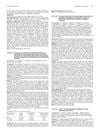
The document concludes that diagnosing female hair loss requires careful examination, with treatments varying by condition and psychological support often necessary.
 August 2018 in “Journal of the American Academy of Dermatology”
August 2018 in “Journal of the American Academy of Dermatology” A new cosmetic cream reduced facial redness and skin temperature after 4 weeks of use.
 July 2018 in “Elsevier eBooks”
July 2018 in “Elsevier eBooks” The most common cause of hair loss in children is tinea capitis, followed by alopecia areata and telogen effluvium.
[object Object]  June 2017 in “Poster presentations”
June 2017 in “Poster presentations” All four treatments for early rheumatoid arthritis had similar safety profiles.

Lupus is a complex disease that requires personalized treatment because it varies greatly between individuals.
 October 2012 in “Humana Press eBooks”
October 2012 in “Humana Press eBooks” Grape seed extract is good for skin care, with antioxidant, anti-inflammatory, and anti-cancer effects.
 August 2012 in “Pharmaceutical Medicine”
August 2012 in “Pharmaceutical Medicine” The document concludes that various medications and treatments can have significant, sometimes adverse, effects on health outcomes.
 December 2011 in “Drug Research”
December 2011 in “Drug Research” The document shows the state of pharmaceutical patents as of 1999, focusing on treatments for various diseases.
[object Object]  July 2008 in “Biomedical Imaging and Intervention Journal”
July 2008 in “Biomedical Imaging and Intervention Journal” New cancer treatments are more precise and less toxic, improving survival rates, but Asia faces challenges in adopting these advancements.
 February 2006 in “Journal of The American Academy of Dermatology”
February 2006 in “Journal of The American Academy of Dermatology” Terbinafine is more effective than itraconazole for toenail fungus, especially in older patients, and debridement improves its effectiveness.
 January 2006 in “The Journal of Korean Medicine Ophthalmology and Otolaryngology and Dermatology”
January 2006 in “The Journal of Korean Medicine Ophthalmology and Otolaryngology and Dermatology” Rubus coreanum may help hair growth but not through the tested mechanisms, and none of the herbal extracts help with acne.
 November 2004 in “John Wiley & Sons, Ltd eBooks”
November 2004 in “John Wiley & Sons, Ltd eBooks” Insulin resistance is linked to PCOS and can lead to other health issues, but treatments like metformin can help manage symptoms.

Integrin alphavbeta6 is important for wound healing and hair growth, and blocking it may improve these processes.
 1 citations,
December 2021 in “JAAD case reports”
1 citations,
December 2021 in “JAAD case reports” A woman with severe hair loss saw significant hair regrowth after adding platelet-rich plasma injections to her treatment with tofacitinib.
January 2024 in “Pharmacoepidemiology” Patients with rheumatoid arthritis using tofacitinib had more serious side effects than those with alopecia areata.
 6 citations,
February 2023 in “Advances in Therapy”
6 citations,
February 2023 in “Advances in Therapy” Baricitinib, a drug for rheumatoid arthritis, atopic dermatitis, and alopecia areata, is generally safe with low risk of major side effects, even in patients with risk factors. It's also effective in promoting hair regrowth in alopecia areata patients.
20 citations,
December 2021 in “Journal of the American Academy of Dermatology” Continuous treatment with ritlecitinib and brepocitinib is needed to maintain hair regrowth in alopecia areata.
 1 citations,
June 2023 in “Dermatology and therapy”
1 citations,
June 2023 in “Dermatology and therapy” People with Alopecia Areata have more herpes simplex infections but similar rates of cancer, blood clots, and heart disease compared to those without it.
 June 2024 in “Journal of Clinical Oncology”
June 2024 in “Journal of Clinical Oncology” The combination of TACE and Donafenib is effective and tolerable for treating unresectable liver cancer.
 2 citations,
August 2022 in “JAAD case reports”
2 citations,
August 2022 in “JAAD case reports” COVID-19 vaccines may rarely worsen hair loss in people with severe alopecia, but the benefits of vaccination still outweigh this risk.
30 citations,
June 2017 in “Journal of cutaneous medicine and surgery” Topical ruxolitinib failed to regrow hair in a 66-year-old with alopecia areata.
 July 2024 in “Clinical Cosmetic and Investigational Dermatology”
July 2024 in “Clinical Cosmetic and Investigational Dermatology” Exosomes can help promote hair growth and may treat hair loss.

Some dermatologists in Saudi Arabia prescribe Tofacitinib for hair loss, but many don't due to its unavailability and safety concerns.
 April 2023 in “Journal of Investigative Dermatology”
April 2023 in “Journal of Investigative Dermatology” Higher PD-1 levels are linked to fewer immune cells in hair follicles in alopecia areata.
278 citations,
May 2013 in “Ca” Targeted anticancer therapies can cause severe side effects similar to traditional chemotherapy, but with different types.
7 citations,
August 2017 in “Journal of dermatological science” Sorafenib causes skin reactions by increasing the number and activity of skin mast cells.
 1 citations,
January 2023 in “SAGE open medical case reports”
1 citations,
January 2023 in “SAGE open medical case reports” A new treatment called deucravacitinib helped a patient with severe hair loss grow their hair back quickly.
July 2024 in “Journal of Controlled Release” Nanostructured lipid carriers effectively deliver tofacitinib to hair follicles, reversing hair loss in alopecia areata.
 January 2023 in “IntechOpen eBooks”
January 2023 in “IntechOpen eBooks” The document concludes that specific methods for making diazine-based drugs can lead to high yields and are important for creating effective treatments for various diseases.
114 citations,
March 2010 in “Zebrafish” PROTO1 and PROTO2 protect against hearing damage.























